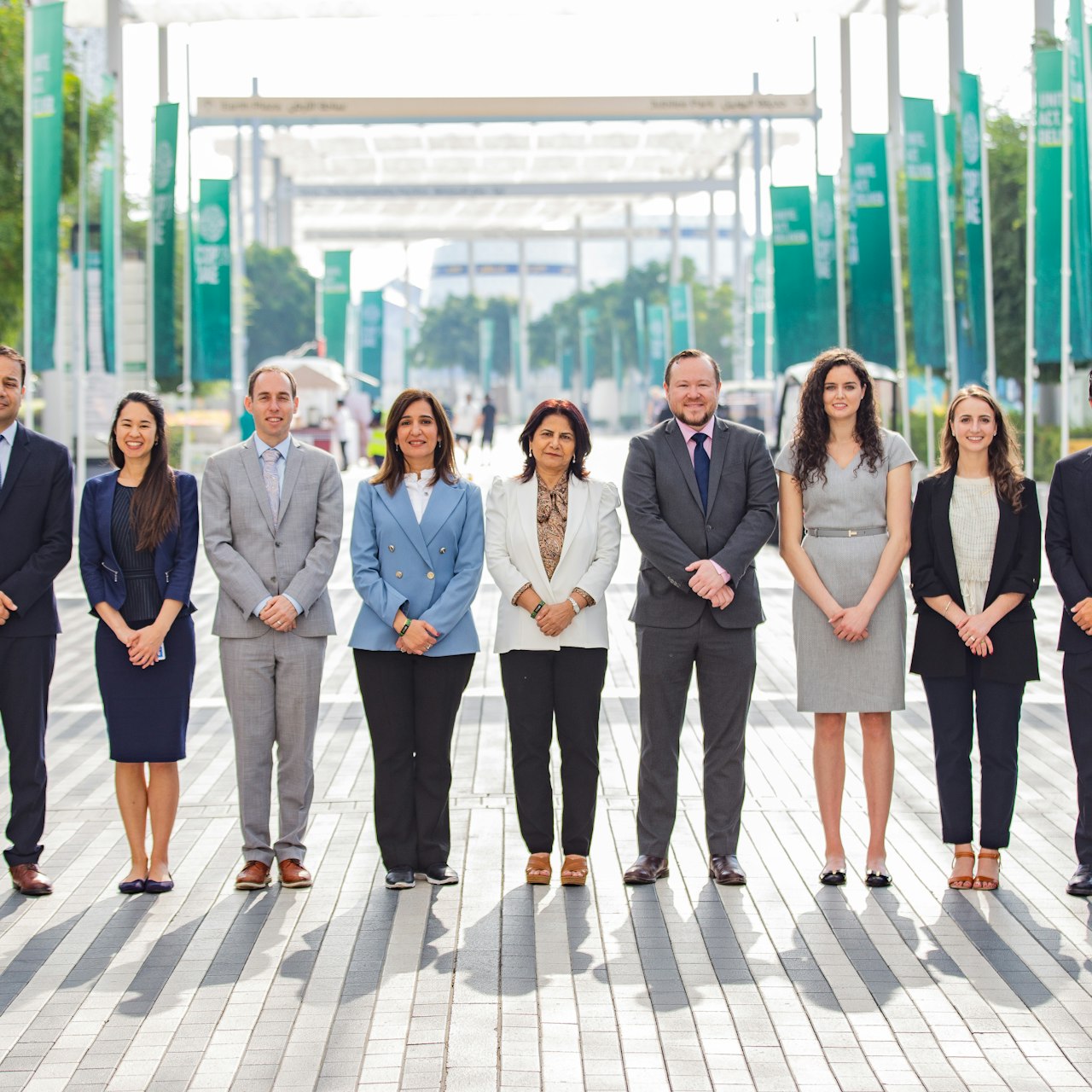
COP28
Broader conception of human progress needed, says the BIC
Delegates of the Bahá’í International Community at COP28 highlight the need for a broader understanding of progress, encompassing both material and spiritual development.

Delegates of the Bahá’í International Community at COP28 highlight the need for a broader understanding of progress, encompassing both material and spiritual development.
DUBAI, United Arab Emirates — In order to address the climate crisis, a searching examination of notions of human progress and development is needed, emphasized the delegates from the Bahá’í International Community (BIC) at the recent COP28 climate conference.
Recognizing the limitations of a purely materialistic viewpoint, they highlighted the need for a broader understanding of progress that encompasses both the material and spiritual development of individuals and societies.
Daniel Perell, a representative of the BIC New York Office and member of the BIC’s delegation, expanded on this perspective, noting: “The prevailing global conditions, shaped by dominant narratives of competition and consumption, call for alternative narratives anchored in principles, including such values as compassion, trustworthiness, and generosity.”
Roeia Thabet, from the Bahá’í Office of External Affairs in the United Arab Emirates (UAE), underscored the need to rethink relationships among social actors in light of a more expansive view of progress, one that reflects the principle of the oneness of humanity.
Dr. Thabet said: “True progress calls for a transformation not just in individual actions but in the relationships among individuals, communities, and institutions. Cultivating these relationships to be increasingly characterized by cooperation and reciprocity is essential to fostering societies that are in harmony with the environment.”
Mr. Perell and Dr. Thabet were joined in the BIC delegation to the conference by Hatem El-Hady from the BIC Cairo Office, Gabriela Rawhani from the BIC Geneva Office, Cecilia Schirmeister and Saphira Rameshfar from the BIC New York Office, Roya Hassan from the UAE, and Ian Hamilton from the United States.
Glimpses of BIC’s participation at COP28
Provided below are a few highlights from contributions of the BIC delegation to discussions at COP28, during which representatives explored themes such as the interdependence of humanity, the need for shared values that can guide actions and initiatives aimed at social progress, and the application of spiritual principles to environmental action.
The 28th United Nations Climate Change Conference, known as COP28, was held in the Expo City Dubai.
Mr. Perell at an event titled “Interfaith Feminist Climate Justice for the Human Right to a Healthy Society and Environment,” which explored the pivotal part that women play in contributing to climate justice.
In his comments, Mr. Perell highlighted the necessity of reevaluating traditional leadership qualities in the context of climate action. “Humility, generosity, compassion, and love are qualities that transcend gender. While historically confined to the realm of ‘care,’ and undervalued in leadership, we are now recognizing their immense value in guiding effective leadership.”
Mr. Perell emphasized that these attributes, often associated with the feminine, are human qualities attainable and necessary for all, regardless of gender.
Gabriela Rawhani (3rd from right) of the BIC Geneva Office speaking at an event titled “Food systems transformation: elevating healthy diets & protein diversification as climate solutions.”
She emphasized the need to bridge the gap between knowledge and action in transforming food systems, anchored in spiritual principles such as justice.
Ms. Rawhani stated: “The analogy of humanity as one body illustrates our interconnectedness. If one part of the body is in pain, the entire body is affected, much like how one section of society’s challenges affects the whole of society.
“True progress and transformation of our food systems will come from seeing ourselves as a whole, not just looking out for the interests of a few.”
A recording of the event can be seen here.
Mr. El-Hady from the BIC Cairo Office with Sultan Al Jaber, COP28 President.
BIC representatives at an event titled “A Values Based Approach to Climate Change,” explored the values that must underline initiatives aimed at social progress, such as consultation and the equality of women and men.
The BIC delegates participated in 12 discussion forums, including an event hosted at Masdar City by the BIC itself in collaboration with the Climate Governance Commission. That event brought together representatives of civil society organizations to explore together paths toward sustainable urban living.
Ms. Rameshfar moderated an event titled “Preserving our Mangrove Ecosystems for a Climate-Just Future.”
The BIC together with the Buddhist Tzu Chi Foundation co-hosted an exhibit booth that invited participants to describe their vision of humanity’s future.
The exhibit brought people from diverse backgrounds together to explore shared values for fostering a world that is in greater harmony with the environment.
From left to right: Dr. Thabet from the Bahá’í Office of External Affairs in the UAE, Ms. Schirmeister from the BIC New York Office, Ovais Sarmad, the former UNFCCC Deputy Executive Secretary, who received a copy of the BIC statement One Planet, One Habitation, and Ms. Rameshfar also of the New York Office.
At the event titled “What is Missing in Climate Discussions and Action?” Ms. Rameshfar highlighted the Bahá’í principle of the harmony between science and religion, noting that technical solutions alone are insufficient in addressing humanity’s challenges.
She highlighted the significance of applying “the insights from religion and experience of faith traditions to bear on the issues that are facing humanity.”
Mr. El-Hady (second from the right) moderated the event titled “A Visual Expression of Sustainability’s Values.”
He stated that “shared values are needed as we move to that realization that we have one common objective, one common challenge as humanity to save this planet, and one common opportunity to work together in unity.”
Cecilia Schirmeister, a representative of the New York Office of the BIC, moderated a youth summit in Abu Dhabi in the leadup to COP28, titled “The Role of Youth in (Re)Imagining and (Co)Constructing Sustainable Communities.”